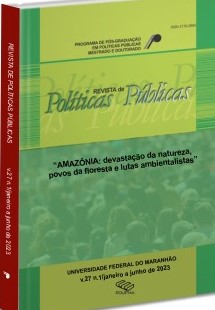MEDICINA TRADICIONAL PERUANA Y PRÁCTICAS POPULARES EN TIEMPOS DE PANDEMIA POR COVID-19
DOI:
https://doi.org/10.18764/2178-2865.v27n1.2023.25Palavras-chave:
Medicina tradicional, prácticas populares, Políticas Públicas, pandemia COVID-19, PerúResumo
El 30 de enero del 2020, la Organización Mundial de la Salud declaró el brote del nuevo coronavirus como una Emergencia de Salud Pública de Importancia Internacional (ESPII), constituyendo el más alto nivel de alerta de la organización. El brote del virus sorprendió a la estructura social de diversas comunidades que no entendían el comportamiento de la nueva enfermedad, pero que podrían tratar de combatirlo con las prácticas cotidianas y populares de la medicina tradicional. Perú se encuentra en la región andina y presenta tres regiones marcadamente diferentes: costa, sierra y selva. Cada región presenta costumbres y creencias diferentes, con gran arraigo en la medicina tradicional y con diversas prácticas populares. En las zonas rurales de cada región es notoria la presencia de curanderos y matronas, quienes prestan servicios empíricos de salud, siendo muchas veces las primeras personas con quienes los pobladores entran en contacto antes de acudir a un establecimiento de salud, para intentar resolver algún problema de salud. La llegada del nuevo coronavirus impactó de forma significativa en la sociedad y la falta de tratamiento específico de la enfermedad complicó la situación. En el interior del país la incertidumbre fue mayor y gran parte de los pobladores optaron por creer más en la medicina tradicional y en prácticas populares empíricas, que en las medidas sanitarias decretadas para la prevención de la enfermedad. Dichas posturas adoptadas por la población para hacer frente a la pandemia resultaron poco o nada efectivas y algunas de las prácticas sólo agravaron la situación de las personas contagiadas con la enfermedad. Frente a tal situación se hace evidente el desafío de nuevas políticas sanitarias que dialoguen con dichos comportamientos sociales con el fin de disminuir el impacto de las enfermedades y fomentar el uso de los servicios de salud. Así, el objetivo del presente trabajo es identificar las practicas más usuales de medicina tradicional en tiempos de Covid-19 y como deben ser entendidas por la gestión sanitaria, teniendo en cuenta que las políticas deben ser inclusivas y abiertas al dialogo de saberes. El ensayo será abordado descriptivamente por medio de la investigación cualitativa y se utilizarán los instrumentos metodológicos de investigación bibliográfica, videográfica y documental.
Downloads
Downloads
Publicado
Como Citar
Edição
Seção
Licença

Este trabalho está licenciado sob uma licença Creative Commons Attribution-NonCommercial-NoDerivatives 4.0 International License.
UNIVERSIDADE FEDERAL DO MARANHÃO
PROGRAMA DE PÓS-GRADUAÇÃO EM POLÍTICAS PÚBLICAS
REVISTA DE POLÍTICAS PÚBLICAS
Termo de Transferência de Direitos Autorais
Como condição para a submissão, os autores devem declarar a autoria do trabalho e concordar com o Termo de Cessão de Direitos Autorais, marcando a caixa de seleção após a leitura das cláusulas)
- Declaro que participei da elaboração do trabalho referido, em parte ou no todo; que não omiti qualquer ligação ou acordo de financiamento entre os autores e instituições ou empresas que possam ter interesses na publicação desse trabalho;
- Declaro tratar-se de texto original, isento de compilação, em parte ou na íntegra, de minha autoria ou de outro (os) autor (es);
- Declaro que o texto não foi enviado a outra revista (impressa ou eletrônica) e não o será enquanto a possibilidade de sua publicação esteja sendo considerada pela RPP;
- Declaro que transfiro os direitos autorais do trabalho especificado para a RPP, comprometendo-me a não reproduzir o texto, total ou parcialmente, em qualquer meio de divulgação, impresso ou eletrônico, sem prévia autorização dessa Revista.
- Declaro que tenho conhecimento que a cessão do texto à RPP é gratuita e, portanto, não haverá qualquer tipo de remuneração pela sua utilização.

Este obra está licenciado com uma Licença Creative Commons Atribuição-NãoComercial-SemDerivações 4.0 Internacional.







